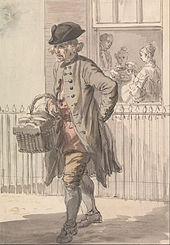The Muffin Man
"The Muffin Man" is a traditional nursery rhyme, children's song, or children's game of English origin. It has a Roud Folk Song Index number of 7922.
The man in question, who lived on Drury Lane in London, may have been a man whose profession was delivering baked goods such as English muffins, or he may have been an impoverished beggar man (like a ragamuffin).
Lyrics
The most widely known lyrics are:
Do [or "Oh, do"] you know the muffin man,
The muffin man, the muffin man.
Do you know the muffin man,
Who lives on Drury Lane?
Yes [or "Oh, yes"], I know the muffin man,
The muffin man, the muffin man,
Yes, I know the muffin man,
Who lives on Drury Lane.[1]
It then repeats on and on.
Origins and meaning
The rhyme was first recorded in a British manuscript circa 1820, that is preserved in the Bodleian Library with lyrics very similar to those used today:
Do you know the muffin man?
The muffin man, the muffin man.
Do you know the muffin man
Who lives in Drury Lane?[1]

Victorian households had many of their fresh foods delivered, such as muffins, which were delivered door-to-door by a vendor known as a muffin man. The "muffin" in question was the bread item known as an English muffin, not the typically sweeter U.S. variety of muffin.[2] Drury Lane is a thoroughfare bordering Covent Garden in London.
The rhyme and game appear to have spread to other countries in the mid-nineteenth century, particularly the US and the Netherlands. As with many traditional songs, there are regional variations in wording; for example, another popular English version substitutes "Dorset Lane" for Drury Lane,[1] while in the Dutch version (entitled Zeg ken jij de mosselman), mussels are substituted for muffins, and Scheveningen, the fishermans harbour near the Hague, for Drury Lane.[3]
In Volume 5 of his contemporary account of the London Prize Ring, Boxiana, published in 1829, Pierce Egan writes of an attempted fix (or "cross") of a match scheduled for October 18, 1825, between Reuben Marten and Jonathan Bissel ("Young Gas"). Young Gas refused to take the bribe and one week later identified the person who offered him £200 to throw the fight as a "Mr. Smith, a muffin-baker in Gray's Inn Lane". Young Gas also identified the "gentlemen" who employed the muffin-baker to act as go between, but those gentlemen denied involvement claiming they did not have "the slightest knowledge of the muffin-man".
Game
Iona and Peter Opie observed that, although the rhyme had remained fairly consistent, the game associated with it has changed at least three times including: as a forfeit game, a guessing game, and a dancing ring.[1]

In The Young Lady's Book (1888), Matilda Anne Mackarness described the game as:
The first player turns to the one next her, [sic] and to some sing-song tune exclaims:
- "Do you know the muffin man? The muffin man, the muffin man.
- Do you know the muffin man who lives in Drury Lane?"
The person addressed replies to the same tune:
- "Yes, I know the muffin man. The muffin man, the muffin man.
- Oh, yes, I know the muffin man, who lives in Drury Lane."
Upon this they both exclaim:
- "Then two of us know the muffin man, the muffin man,".
No. 2 then turns to No. 3, repeating the same words, who replies in the same way, only saying, "Three of us know the muffin man,". No. 3 then turns to No. 4, and so on round the room, the same question and answer being repeated, the chorus only varied by the addition of one more number each time.[4]
Verses beyond those described in the book have been sung. For example, the song may be concluded, "We all know the Muffin Man ..."
In popular culture
"The Muffin Man" is referenced several times in the Shrek series. First mentioned in Shrek (2001), a variant of the lyrics are used in a scene where the villain Lord Farquaad tortures and interrogates Gingy the Gingerbread Man. This scene was recreated in Shrek The Musical (2008-2018) and the fan film Shrek Retold (2018), and was shared on social media in 2022 to mock Amber Heard and her lawyers for a fifteen-minute discussion about muffins during the court case Depp v. Heard.[5][6]
The Muffin Man appears as a character in the 2004 sequel Shrek 2 and the 2010 Halloween television special Scared Shrekless. He is revealed to be Gingy's "father", being the creator of Gingy; Mungo in Shrek 2; and Sugar in "The Bride of Gingy", the latter of which is a short spoofing Bride of Frankenstein (1935) with the Muffin Man analogous to Dr. Frankenstein.
Notes
- ^ a b c d I. Opie and P. Opie, The Singing Game (Oxford: Oxford University Press, 1985), pp. 379–82.
- ^ K. F. Kiple, and K. C. Ornelas, The Cambridge World History of Food (Cambridge: Cambridge University Press, 2000), p. 1224.
- ^ van Zantwijk, Bert (24 July 2016). "Zeg ken jij de Mosselman". Wordpress. Retrieved 25 May 2018.
- ^ Matilda Anne Mackarness The Young Lady's Book: A Manual of Amusements, Exercises, Studies, and Pursuits. (London: George Routledge and Sons, 1888), pp. 278–280.
- ^ Nolan, Emma (27 April 2022). "'Muffin Man': Johnny Depp Trial Moment Sparks Comparisons to 'Shrek' Scene". Newsweek. Retrieved 16 June 2023.
- ^ Williams, Kori (27 April 2022). "Here's Why the Latest Witnesses in Johnny Depp and Amber Heard's Trial Could Have Been Muffins". Distractify. Retrieved 16 June 2023.
